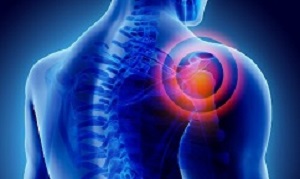 Surgery should not be performed in almost all patients with a common cause of shoulder pain known as subacromial pain syndrome or SAPS (also called shoulder impingement or rotator cuff disease), say a panel of international experts. Their strong recommendation against surgery is based on new evidence that it does not sufficiently improve pain, movement, or quality of life compared with other treatment options. This new and sound evidence should change practice, given the risk of harm and burden to patients and waste of health care resources, they say.
Surgery should not be performed in almost all patients with a common cause of shoulder pain known as subacromial pain syndrome or SAPS (also called shoulder impingement or rotator cuff disease), say a panel of international experts. Their strong recommendation against surgery is based on new evidence that it does not sufficiently improve pain, movement, or quality of life compared with other treatment options. This new and sound evidence should change practice, given the risk of harm and burden to patients and waste of health care resources, they say.
Their advice is part of The BMJ Rapid Recommendations initiative – to produce rapid and trustworthy guidance based on new evidence to help doctors make better decisions with their patients.
Subacromial pain syndrome refers to non-traumatic pain, weakness or loss of movement around the shoulder, particularly when lifting the arm. It is common in people over 40 years old and decompression surgery is a common way to manage symptoms if they do not resolve after simple treatments. There were 21,000 procedures performed in the UK's National Health Service (NHS) hospitals in 2010, which cost around £50m.
Yet recent trials found that decompression surgery provided no benefit over placebo surgery, or other options such as painkillers, exercises, and steroid injections.
So, an international panel – made up of bone surgeons, physiotherapists, clinicians and patients with experience of shoulder pain and surgery – decided to carry out a detailed analysis of the latest evidence and create a recommendation according to standards for trustworthy guidelines and the GRADE approach (a system used to assess the quality of evidence).
Their strong recommendation against surgery is based on two systematic evidence reviews, one on the benefits and harms of decompression surgery and another on meaningful improvements in pain, movement, and quality of life valued by patients.
The panel was confident that surgery provides no important benefit on pain, function, quality of life, or overall perceived effect. Surgery is also burdensome, has potential for serious harm, and is expensive, they add.
The panel felt that almost no one who fully understands the evidence would choose to have surgery.
“Clinicians should not offer patients subacromial decompression surgery unprompted, and clinicians, public healthcare providers, and others should make efforts to educate the public regarding the ineffectiveness of surgery,” they write.
However, they point out that there is substantial uncertainty around what would be better offered as an alternative.
Abstract
Clinical question: Do adults with atraumatic shoulder pain for more than 3 months diagnosed as subacromial pain syndrome (SAPS), also labelled as rotator cuff disease, benefit from subacromial decompression surgery? This guideline builds on to two recent high-quality trials of shoulder surgery.
Current practice: SAPS is the common diagnosis for shoulder pain with several first line treatment options, including analgesia, exercises, and injections. Surgeons frequently perform arthroscopic subacromial decompression for prolonged symptoms, with guidelines providing conflicting recommendations.
Recommendation: The guideline panel makes a strong recommendation against surgery.
How this guideline was created: A guideline panel including patients, clinicians, and methodologists produced this recommendation in adherence with standards for trustworthy guidelines and the GRADE system. The recommendation is based on two linked systematic reviews on (a) the benefits and harms of subacromial decompression surgery and (b) the minimally important differences for patient reported outcome measures. Recommendations are made actionable for clinicians and their patients through visual overviews. These provide the relative and absolute benefits and harms of surgery in multilayered evidence summaries and decision aids available in MAGIC (www.magicapp.org) to support shared decisions and adaptation.
The evidence: Surgery did not provide important improvements in pain, function, or quality of life compared with placebo surgery or other options. Frozen shoulder may be more common with surgery.
Understanding the recommendation: The panel concluded that almost all informed patients would choose to avoid surgery because there is no benefit but there are harms and it is burdensome. Subacromial decompression surgery should not be offered to patients with SAPS. However, there is substantial uncertainty in what alternative treatment is best.
Authors
Per Olav Vandvik, Tuomas Lähdeoja, Clare Ardern, Rachelle Buchbinder, Jaydeep Moro, Jens Ivar Brox, Jako Burgers, Qiukui Hao, Teemu Karjalainen, Michel van den Bekerom, Julia Noorduyn, Lyubov Lytvyn, Reed A C Siemieniuk, Alexandra Albin, Sean Chua Shunjie, Florian Fisch, Laurie Proulx, Gordon Guyatt, Thomas Agoritsas, Rudolf W Poolman
[link url="https://www.bmj.com/company/newsroom/expert-panel-strongly-recommends-against-surgery-for-the-most-common-shoulder-pain/"]BMJ material[/link]
[link url="https://www.bmj.com/content/364/bmj.l294"]BMJ abstract[/link]
[link url="https://www.bmj.com/content/364/bmj.l586"]BMJ editorial[/link]
